|
In this article, an analysis is made of two response models for different forms of abuse and violence that occurred in the past on children in institutional settings. Two programmes are compared, as they operated during last 10 years in Belgium: on the one hand the Centre of Arbitration for sexual abuse and violence in the Catholic Church at the national level, on the other hand the Commission for Recognition and Mediation for various types of abuse and violence in youth and educational institutions and other organisational contexts in the Flemish Community. Both models are analysed and compared at the conceptual and empirical level from a restorative justice approach, looking at the elements that may reveal a certain form of restorative justice and/or may contain lessons for the further development of restorative justice. The background and origins of both programmes are presented into detail, followed by a comparison with respect to the political options on the basis of their creation, the composition of their boards, their scope of application and their procedures. Some numbers and characteristics of cases dealt with are presented. |


Tijdschrift voor Herstelrecht
Meer op het gebied van Mediation en herstelrecht
Over dit tijdschriftMeld u zich hier aan voor de attendering op dit tijdschrift zodat u direct een mail ontvangt als er een nieuw digitaal nummer is verschenen en u de artikelen online kunt lezen.
| Column |
MiS: Manipuleren in Strafzaken? |
| Auteurs | Tanja van Mazijk en Marion Uitslag |
| Auteursinformatie |
| Redactioneel |
Over methodieken in het herstelrecht |
| Auteurs | Annemieke Wolthuis en Ivo Aertsen |
| Auteursinformatie |
| Artikel |
|
| Trefwoorden | institutioneel misbruik en geweld, responsmodellen, rooms-katholieke kerk, Centrum voor Arbitrage inzake seksueel misbruik, Permanente Arbitragekamer |
| Auteurs | Ivo Aertsen en Martien Schotsmans |
| SamenvattingAuteursinformatie |
| Artikel |
Twintig jaar groei van herstelrechtelijke programma’sReflecties op basis van de tweede editie van het UNODC Handboek |
| Trefwoorden | UNODC handbook, Restorative Justice programmes, Basic Principles, cases of serious crime, community |
| Auteurs | Jee Aei Lee en Yvon Dandurand |
| SamenvattingAuteursinformatie |
|
In this contribution, the authors take stock of the many diverse restorative justice programs that have been implemented in many countries, worldwide, over the past twenty years, and that have involved a number of problems. They also discuss a number of new developments and areas of concern, including victim participation, the relationship with common law, cases of serious crime and the role of the community. The authors hope the new UNODC Handbook on Restorative Justice Programmes to be as successful as the previous edition in promoting new ways to apply restorative justice principles in criminal matters and helping practitioners benefit from each other’s experience. |
| Artikel |
Mediation in strafzaken: de werkstijl is de methodeReflecties op de praktijk |
| Trefwoorden | strafzaken, mediation, mediatorprofiel, mediationproces, psychologische veiligheid |
| Auteurs | Makiri Mual |
| SamenvattingAuteursinformatie |
|
Since the beginning of 2020 mediation in penal cases (mediation in strafzaken) has officially become the preferred intervention for victim-offender mediation in the criminal procedure in the Netherlands. Although mediation in general has a sound theoretical framework, the methodological elaboration appears pluriform and somewhat limited. In practice mediators in penal cases operate conform their own personal and professional standards and preferences, apparently without tailor made methodology. This article describes the current methodological directions such as transformative or narrative mediation and seeks for useful references. As a part of restorative practice, mediation in penal cases seems to remain secluded from insights and methodology developed in the domain of restorative justice practices. Educational institutes providing trainings for mediators barely refer to this theoretical framework. Besides a methodological reconnaissance this article offers a fundamental comparison of mediation styles and interventions, but is above all an incentive to further methodological research and development. |
| Discussie |
Welke toekomst voor herstelrecht in Brussel? |
| Trefwoorden | CONRAD, participatief actieonderzoek, Brussel, radicalisering, Marokkaanse jongeren |
| Auteurs | Ali Moustatine, Tom Flachet en Erik Claes |
| SamenvattingAuteursinformatie |
|
This article critically examines the prospects of restorative justice in Brussels from the perspective of urban youth work. The insights issue from action research on the topic of ‘radicalisation’. The authors develop two arguments. The first tempers restorative optimism. It shows how restorative interventions are not necessarily the most adequate response to tensions and conflicts in urban settings. The second argument points out that resistance from urban youth workers regarding the implementation of restorative interventions should not be seen as a regrettable obstacle for academics who are eager to experiment with these interventions. Such a resistance can lead to new insights and fresh opportunities to radically rethink Restorative Justice. One of the ideas that the article brings to the surface comes down to this. In a city like Brussels, characterised by superdiversity, and clearly marked by social inequalities, academic researchers only gain credibility in initiating restorative interventions if they undeniably denounce these inequalities and fully express their engagement for social justice. |
| Praktijkberichten |
‘Eigenlijk doen we voortdurend aan intervisie met elkaar’Een dubbelinterview over landsgrensoverschrijdende zaken |
| Auteurs | Mieke Wouters |
| Auteursinformatie |
| Signalement |
The beauty and trouble of reparationThe European Forum for Restorative Justice is celebrating 20 years of restorative work |

